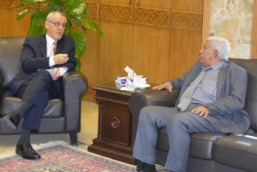 13 January 2016, Cairo, Egypt – Yemen’s Minister of Public Health and Population Dr Nasir Baoum and WHO’s Regional Director for the Eastern Mediterranean Dr Ala Alwan met today to discuss the humanitarian and health situation in Yemen.
13 January 2016, Cairo, Egypt – Yemen’s Minister of Public Health and Population Dr Nasir Baoum and WHO’s Regional Director for the Eastern Mediterranean Dr Ala Alwan met today to discuss the humanitarian and health situation in Yemen.
“The situation in Yemen is critical. Hospitals, laboratories, blood banks and other health facilities are increasingly unable to remain functional as they face shortages in medicine and other supplies. The national blood transfusion centre in Sanaa is operating at a minimum capacity due to shortages of fuel and essential supplies. The main oxygen-generating plant ceased to function in April due to lack of fuel, and hospitals are in urgent need of oxygen. The Heart Centre in Sana’a is running critically low on medicines and medical supplies, and medicines and supplies for chronic diseases, such as diabetes, renal diseases and cancer are unavailable,” said Dr Baoum.
More than 15.2 million people in Yemen are facing challenges in accessing basic health services. Shortages of health care workers and medical supplies in Yemen have reached critical levels, forcing many health facilities to fully or partially close. Medicines that were previously purchased in-country by WHO for distribution to health facilities are no longer available on the local market. “We are extremely concerned by the situation in Yemen, and are committed to working with partners to ensure that health services are available despite the extremely difficult circumstances.” said Dr Alwan.
WHO and partners continue to face difficulties in reaching affected populations due to access restrictions in parts of the country, with more than one third of those in need of health services located in inaccessible areas. Most recently, 5 WHO trucks carrying medicines and health supplies, including oxygen, have been prevented from entering Taiz City for more than 3 weeks. “Health is neutral, and all people have a right to health care, especially life-saving health services. Our mandate as WHO is to ensure the provision of these services to all people in need, regardless of their affiliation or geographic location”, said Dr Alwan.
“Since March, WHO has been able to reach almost 7 million people through the provision of medicines, mobile clinics, health teams, fuel and safe water. However, many more people need urgent aid, and much more needs to be done by WHO and partners to reach them. We need to be able to reach all affected people to identify health needs, assess nutritional status, and ensure health services are available. If access for the provision of aid is not made immediately available, millions of people are at risk of facing a humanitarian and health disaster”, added Dr Alwan.
Related link
Read the latest situation reports
For more information, please contact:
Mr Sadeq Al-Wesabi
Communications Officer
+967 733096603
Cette adresse email est protégée contre les robots des spammeurs, vous devez activer Javascript pour la voir.





